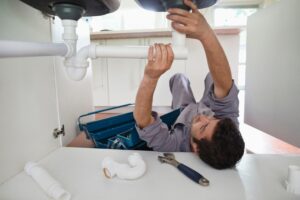When a plumbing issue strikes—whether it’s a burst pipe, clogged drain, or leaking water heater—calling in a professional plumber is usually the smartest move. Plumbers have the tools, training, and experience to fix problems quickly and safely, often saving you time, stress, and costly DIY mistakes.
But before you hire a plumber, it’s a good idea to understand how much does a plumber cost per hour and what factors can influence those rates. From the type of plumbing repair to your location and even the time of day, several things can impact the final bill.
Knowing what to expect can help you avoid surprises, plan your budget, and make informed decisions when choosing a local plumber. In this guide, we’ll break down average plumber costs per hour, common plumbing service prices, and what goes into plumber charges—so you feel confident and prepared when it’s time to bring in the pros.
What Determines a Plumber’s Hourly Rate?
Like other skilled trade professionals, a plumber’s hourly rate is influenced by several key factors:
Experience Level
The national average cost for a plumber cost per hour falls between $45 and $150 per hour. A master plumber with decades of experience and specialized licensing will command rates at the higher end of the scale. Apprentice plumbers and journeyman plumbers early in their careers charge less.
Overhead Costs
Plumbing companies incur expenses for tools, vehicles, insurance, licensing, and more. These overhead costs are built into plumber rates so they can cover expenses and make a profit. Large companies with more equipment generally have higher plumbing prices.
Supply Costs
Parts and materials such as a faucet or fixture are typically charged at retail rates on top of quoted labor rates. A basic supply markup averages 20% to 30%. Some plumbing contractors offer discounts on supplies to stay competitive.
Emergency Service
For after-hours, weekend, or urgent calls, plumbers may charge higher hourly rates due to overtime wages. If extensive troubleshooting is required, costs add up quickly.
City/Region
In expensive metro areas with a high cost of living, plumbers usually charge at the upper end of the national range. Rates trend lower in less populated regions.
Flat Rate vs. Time & Materials Billing
When you request a plumbing service call, it helps to understand the two primary billing methods:
-
Time and Materials Billing: The plumber charges by the hour for labor plus markup on parts/materials. This open-ended approach works well for complex plumbing projects with an uncertain scope. Expect to pay a fair cost per hour plus parts.
-
Flat Rate Billing: Best for routine plumbing jobs, where plumbers charge flat rates upfront. Flat rate jobs typically range from $175 to $500 per project depending on complexity. This offers cost certainty but less transparency on labor rates.
Knowing whether a local plumber charges per hour or by the job informs what questions to ask upfront. Always request a written cost estimate before approving expensive repairs.
Average Cost of Common Plumbing Jobs
Beyond plumber cost per hour, here are typical plumbing costs for common jobs (prices vary by location and type of plumbing service):
-
Unclogging a Drain: $100–$250
For a slow drain or backed-up sink, a plumber service like drain cleaning usually fixes the issue quickly.
-
Toilet Installation: $150–$350
Labor is typically a couple of hundred dollars, plus the cost of the toilet.
-
Water Heater Repair: $200–$600
Fixing a water heater may involve a thermostat or heating element replacement. Emergency plumbing services may cost more.
-
Burst Pipe Repair: $300–$1,000
The repair cost depends on location, accessibility, and whether after-hours emergency service is required.
-
Sewer Line Replacement: $3,000+
A major plumbing project that often requires a professional plumber due to its complexity.
When Are Plumbers Worth the Cost?
Given the cost to hire a plumber, is it worth it? Absolutely. Attempting DIY fixes can worsen common plumbing issues. Hiring a professional plumber ensures safety and quality results.
For urgent needs, like emergency plumbing services, cost becomes secondary to preventing damage. For future repairs, compare quotes from local plumbers and look at their hourly rates and service fees.
How to Save on Plumbing Costs
-
Preventative Maintenance: Keep up with basic plumbing tasks like flushing your water heater and checking for leaks to avoid big plumbing repair costs.
-
Bundle Repairs: Combine multiple common plumbing jobs in a single service call to avoid extra service fees.
-
Ask About Fees: Clarify diagnostic or service call fees and whether they apply to the final bill.
-
Get Multiple Quotes: Plumbing rates vary. Multiple quotes help you find fair pricing.
-
DIY Small Plumbing Repairs: Simple fixes like tightening a faucet handle or replacing a flapper may cost around $20 DIY versus $200 if you pay a plumber.
Maintenance Tips to Avoid High Plumber Costs
-
Avoid pouring grease down drains
-
Insulate pipes to prevent freezing and bursting
-
Inspect fixtures monthly for leaks
-
Flush your water heater annually
Conclusion
Plumbing problems aren’t fun, but knowing how much does a plumber cost, what plumbers charge per hour, and what factors affect plumber costs makes the process less stressful.
Next time you need a plumber, you’ll be prepared to compare plumbing prices, understand the cost per hour, and hire a professional who provides value and quality service. Preventive care and regular maintenance will help keep plumbing costs under control.










